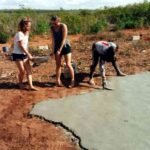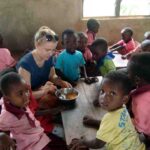- The program
- The communities
- Volunteer accommodations
- Volunteers’ meals
- Entertainment and sight-seeing
- Volunteers’ safety
- Minimum qualification required
- Rough estimate of total cost involved
- Next steps — after you have been accepted
- Other relevant facts about the program
- Apply for this program
- Sign up for our newsletter
- Submit a question
The program
The focus of the project is to propagate positive health practices in households and communities and to push for changes in cultural norms that would sustain and embed these good practices in the villages and towns within our scope of operation. With the main goal of the project being the improvement of health status of inhabitants of the target communities, the project will use Community Mobilization, Community Based Distribution, Capacity Building and Monitoring and Evaluation to achieve its target.
Key responsibilities:
- Assist community health nurses at the local health center.
- Assist local volunteer and community to develop a community action plan when absent and facilitate its implementation.
- Organize community meetings and educate the gathering on a health topic.
- Home visits to educate household on a selected health topic or topics.
- Identify social groups in the community, attend their meetings and educate them on selected topics.
- Fill data collection forms with local volunteer and submit to field facilitator.
- Facilitate community health outreach programs
- Assist in organizing health training programs for focus groups in the community.
- Partner the local volunteer to organize focus group discussions on a health topic.
- Refer health cases to health center.
The communities
Participating communities are in Bawjiasi in the Central region, Kitase in the Eastern Region and Prampram and Dowenya (aka Dawhenya) in the Greater-Accra Region. Back to top
Volunteers’ accommodation
Volunteers live in the dedicated Volunteer House. Each bedroom in the house can contain three separate beds; three volunteers. The resident cook shall provide delicious meals – no matter your personal diet restrictions. Volunteers coming as a pair or couple will not be placed with other volunteers in the same bedroom. We recommend that you bring along a mosquito net and a spare bed sheet. Many homes have a shower and flush toilet. In others you would have to manage with a bucket of water and a pit toilet – more likely in smaller towns and villages. Laundry is usually done with a couple of buckets. Back to top
Volunteers’ meals
Breakfast: 6.30 – 7.00 am
Lunch: 12.30 – 1.00 pm
Dinner: 6.00 – 7.00 pm
Volunteers will be fed a variety of food including indigenous African dishes such as yam, plantain, fufu, banku and red-red, as well as ‘foreign’ meals such as rice and pasta. Volunteers with special dietary stipulations such as vegetarianism or lactose intolerance can easily be catered for. Volunteers have to budget for their own drinking water. Bottled (as well as filtered, bagged) water is available for purchase in many parts of the village. A 1.5 liter bottle costs about US$0.85 whilst a pack of bagged filtered water (popularly known as ‘pure water’) costs about US$0.90. One pack of bagged filtered water contains twenty-five 0.5 liter pieces of ‘pure water’ sachets or bags. An alternative to buying bottled or ‘pure water’ would be to treat the tap-water with water purification tablets. Water purification tablets are not readily available in Ghana so you would have to bring some along if you intend to treat your own drinking water. Back to top
Entertainment and sight-seeing
Weekends (Friday afternoon till Sunday evening) are free days. Volunteers at the children’s home usually would organize entertainment and sight-seeing trips as a group to interesting places far and near. Back to top
Volunteers’ safety
Your safety is of paramount importance to VIGS GHANA. As such we give you all the relevant safety tips, plus we place you only in places where good medical services are within easy reach. In addition, we’ll give you a smart phone – so you can call or text or email or Whatsapp the in-country supervisors whenever the need arises. Our in-country support staff are on call 24 hours a day, 7 days a week. Back to top
Minimum qualification required
Applicants for this program must be able to communicate in simple English since English is the official language of communication in Ghana. Back to top
Rough estimate of total cost involved
- Flight to and from Ghana: US$600-1250 (Round-trip)
- Ghana visa: US$80-170
- Vaccinations: US$150-250
- Travel Insurance: US$70-320
- Miscellaneous personal items: US$300-900
- Personal Spending money whilst in Ghana: US$200 upwards
- VIGS GHANA Program fee: starts from US$450
So, a rough estimate of the total cost for a two-week program duration would be about US$1,870 – 3,560. Check the equivalent in your currency. Back to top
Next steps — after you have been accepted and given your Placement information
After you have been admitted to participate in the program, you would now have to execute the following:
- Book a flight. See our Ghana flight information page. The earlier you book and confirm your flight, the better.
- Go through the suggested checklist of items to do and bring and start getting (or packing) them
- Send us your flight itinerary
- 60-30 days before your departure date, you must start processing for your Ghanaian visa. VIGS-GHANA will provide you with the needed references in Ghana — which are needed to obtain a Ghanaian visa. Back to top
Other relevant facts about the program
- Minimum volunteering/internship duration: 1 week.
- Maximum duration: 6 months.
- Age range accepted: 18 – 75 years.
- We will send you a document on how to fund-raise for your trip – after you’ve confirmed your participation.
- We will meet you at the Airport in Accra (ACC) on your arrival day.
- The average work day is 3-8 hours for this program.
- Saturdays and Sundays are free days.
- You can contact VIGS GHANA local staff on cell phones all the time — 24 hours a day — seven days a week.
- We can give you a Testimonial on successful completion of your volunteer or internship work.
- You can pay the program fee through any of the following methods:
- By PayPal or credit/debit card.
- Cash installments (or full payment) upon arrival into Ghana.


